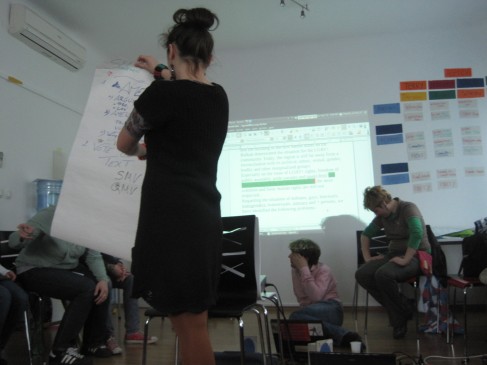As i noticed on the last session in Zagreb, most of you are interested in queer theory, but you haven’t had any moments in life to really look up what the fuck is that. So, i’ll use this blog to introduce you to the magnificent world o f being queer in philosophical terms, being outside mainstream, hetero-normative way of thinking.
First thing i’ll try to give to you is how to (not) define something that is not possible to define.
Announcing newest edition of “popular books” , Serbian daily newspaper “Politika” (Politics) shortly describe us plot of novel “Kiss of spider-woman” , of Manuelo Puigi (1932-1990) , novelist from Argentina. Two interlocutors, said in article, prisoners of same cell in one prison of Buenos Aries, 26-years old political activist and 37- years old homosexual have, modestly said, interesting dialogue. Homosexual guy got assignment from government to receive as much information from activist as he can, about regime topic. Everything we know about main characters in novel is their age. We don’t know their names. Seems legit for author that only two identity reference, one about politics issue, another about sexuality is everything that reader should know and these things are much important for readers than other things like their education level, skin color, etc. Let’s assume that journalist has good intention for this, but, took one question in the motion: What will happen with such stressing of identities, this unique identity reduction, in the moment when “political activist” and “homosexual” leave the prison, when we get context? Will they, on freedom, have more freedom of this identities which was just suitable for them behind bars? “Political prisoner” won’t be that anymore, for sure, in worse scenario he’ll become “Ex political prisoner”. But, what about “homosexual” . Can he become at least “ex” . Can this information about his sexual orientation go under shadow of other personality determinants (so identity of “homosexual” would be also kind of provisional identity?)- Can he be Luis Molina- glass-worker, engineer, salesperson, actor? On the final, whether someones (homo)sexual practices and desires something from which all can be derived?
Article in “Politica” actually tells us that and in the same time express widespread and over one century old stereotype that sexual practices, desires, taste reveal us someones deep “truth of being” , especially when they are not exactly comparable with mainstream sexuality issue. Nothing on him or in him escapes his sexuality- remind the description of “becoming homosexuals” in 19th century by Foucault. It’s present everywhere inside him, it’s in root of his work, everything is insidious and limitless actively principle , shamelessly written on his body and face, it’s a secret that keeps revealing. Sodomite falls in sin over and over, but homosexuals became species. Homosexual in nineteenth century became person: He has past, childhood, character, way of life, morphology, indiscreet anatomy and, maybe, mysterious physiology.
Question of (homo)sexual identity, its origins, history and construction, trans-historical and trans-cultural character, its synchronous and diachronic differences repressive but exculpatory and mobilizing potential, represents framework “anti-identity” theoretical direction, almost worldwide accepted “term” – queer theory. Its flywheel is in sociological deconstructionism and its numerous implications (insights primarily by sociologists, but also historians, philosophers) that the social world isn’t given so it could be just divulged. The social world was made or invented by words: “Society is a human product” and beside that also in poststructuralist notions on fraud nature of signifiers.
Đorđe
Green queer kisses!













